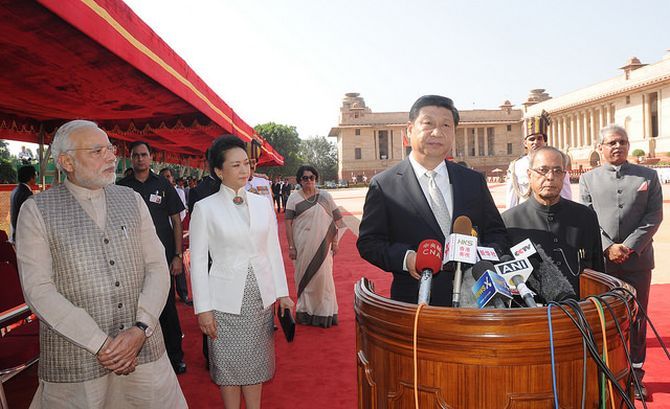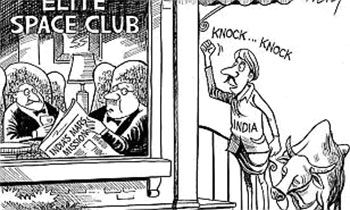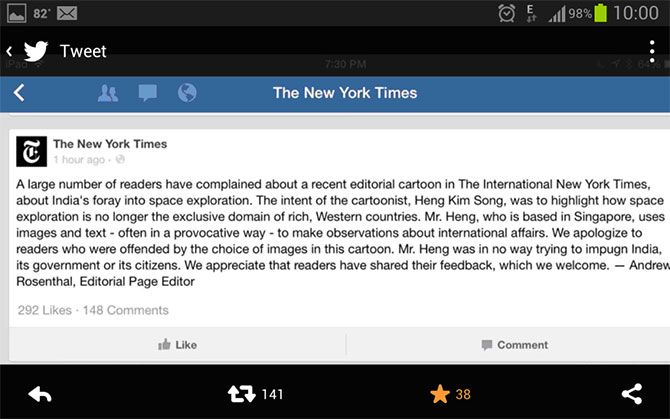 'Modi is a symbol of Asia Rising; and, for the first time in decades, a non-white has the potential to be the most compelling global leader,' says Rajeev Srinivasan.
'Modi is a symbol of Asia Rising; and, for the first time in decades, a non-white has the potential to be the most compelling global leader,' says Rajeev Srinivasan.
There were two audiences for Prime Minister Narendra Modi on his visit to the United States: One, the Obama administration, and two, the American, and indeed global, public.
It was a foregone conclusion that nothing would happen with the US government: I wrote that Modi could expect absolutely no progress given the general hostility of the Obama administration, and the fact that is was preoccupied by Iraq, Syria, Afghanistan and Ukraine.
On the other hand, Modi's outreach to Indian Americans, US politicians, US industry, and a global audience in general, went off well. His public events at Madison Square Garden and in Central Park were both well-received by all, except, strangely, the mainstream US newspapers.
It was a successful coming-out party, and the fact that a politician was able to attract rock-star-style adulation was remarked on with appreciation.
The best indicator of the public impact was that major television personalities -- in particular, Jon Stewart of The Daily Show -- parodied Modi, going so far as to compare him to the Great Communicator, Ronald Reagan, and lampoon his studied Americana, 'May the force be with you!' Apparently he did make quite an impact.
The fact that Modi wrote an op-ed in the The Wall Street Journal and co-wrote another with Obama in The Washington Post was interesting, although not unprecedented: It showed that even the mainstream media was keen on hearing what he had to say. Or it could be that he had hired a good PR agency.
Not surprisingly, the only people who insisted on downplaying Modi's visit were the influential, allegedly 'liberal' mainstream Western print media such as The New York Times, The Boston Globe, The Guardian and The Economist. Not one of them ran a front-story on Modi's Madison Square Garden extravaganza.
The Economist ran a tasteless piece that tried to be funny and ended up nasty: It later apologised.
This magazine is exhibiting chronic foot-in-mouth disease: During the election campaign, it ostentatiously endorsed Rahul Gandhi (although nobody had asked it for its views). It ended up making abjectly craven mea culpas when incensed Indians slammed it and its favourite was wiped out. No doubt that rankles. Apparently it doesn't feel it is being given the respect it is accustomed to; plus its Atlanticist world-view is under threat.
 As for The New York Times, the neglect was on top of another, rude, plainly racist and graceless taunt post-Mangalyaan in the form of a cartoon, reminding one of the colonial-era 'No dogs and Indians allowed.'
As for The New York Times, the neglect was on top of another, rude, plainly racist and graceless taunt post-Mangalyaan in the form of a cartoon, reminding one of the colonial-era 'No dogs and Indians allowed.'
But the cartoon was surprisingly prescient, although not in the insulting way The New York Times intended: The humble chaiwallah is indeed forcing his way into exclusive Western clubs.
In keeping with now-routine tactics, The New York Times also apologised (the following image thanks to a tweet by Raju Narisetti of NewsCorp). So the modus operandi is: Insult, and if there is pushback, offer a pro-forma apology. Shoot-and-scoot.

There should be some reason for the fretfulness of the Western media power-brokers. And I think I know what it is: Narendra Modi was announcing that a new global leader has arrived. That, perhaps was his principal reason for going to New York, as he should have no love lost for a country that had lied about him, offended him, and rooted for his defeat in the elections.
There's a new kid in town, as The Eagles once sang. But, as they also said, fame is fleeting, and I am sure the PM is aware of that -- which is why he is a man in a hurry.
At the moment, though, I'd be so bold as to say that Narendra Modi is the most important statesman in the world, and the American politicians who met him seem to have recognised this.
In a world that is fast running out of statesmen, Modi has just shown that he could well be a world leader, not just an Asian or regional leader.
Compare Modi to other world leaders, and you'll see that not one of them is as inspiring as he is.
America's Obama, whose popularity ratings are at about 40 per cent and falling, and whose interventions from Obamacare to Syria and ISIS are all under fire.
The British prime minister, whose name I can't even remember, and whose country almost fell apart just two weeks ago.
France's Hollande, whose party just lost its majority in the Upper House.
Putin of Russia, severely maligned, is of course persona non grata in the West over Ukraine.
Xi of China, facing an economic slowdown and serious disturbances in Tibet, Xinjiang and now Hong Kong, which he will of course put down with an iron hand.
Abe of Japan, struggling to get his moribund economy off the rocks and fend off the rampaging Chinese.
Compare them to Modi, with his overwhelming mandate, and upbeat confidence about India's future potential. Clearly Modi trumps every one of his peers in the perception sweepstakes: He makes them nishprabha in comparison.
This is the reason that the Western MSM is so reluctant to embrace Modi (of course, apart from just plain old-fashioned racism): Modi is a symbol of Asia Rising; and, for the first time in decades, a non-white has the potential to be the most compelling global leader.
He is a product of the end of Atlanticism, and the rise of the Indo-Pacific. Plus, Modi is a far cry from the easily-dismissed, naive Non-Aligned Movement and its strutting Nassers, Titos, Sukarnos and Nehrus: This is a thoroughly modern leader, and a nationalist, not a feckless internationalist.
And Modi is in fact a Great Communicator. His seductively simple goals of 'Make in India' and prosperity for all are easy to get enthused about, especially when Modi delivers them in style in Hindi.
I would not be surprised if quite a few MNC bosses calculate that Modi's 'Democracy, Demography and Demand' scenario is not all that far-fetched. He might get some of the FDI he is asking for, especially if he focuses on engineering-heavy sectors: The success of 'frugal innovation' in the cases of the Tata Nano and Mangalyaan indicates a core competency.
At the United Nations too, Modi cut a statesman-like figure, discussing global issues such as terrorism, UN reforms, climate change, the war against ISIS, and so forth, and dismissing Pakistan's peevish mention of Kashmir the previous day. He elevated himself above regional tensions that normally bedevil Indian prime ministers, and showed himself as a global thinker.
But Modi epitomises the old saw: 'Think global, act local.' Fittingly, he follows in the footsteps of another Gujarati, Mohandas Gandhi, who said: 'I do not want my house to be walled in on all sides and my windows to be stuffed. I want the culture of all lands to be blown about my house as freely as possible. But I refuse to be blown off my feet by any.'
He demonstrated as much by sticking to his Navaratri fast and his warm-water diet, in an assertion of his Indian heritage.
This is anathema to the powers-that-be in the West, who are used to bribing or bullying or otherwise browbeating emerging-market leaders into submission. A star is born. They don't like it one bit, but they can lump it, and they will have to deal with him.
Image: Prime Minister Narendra Modi with Chinese President Xi Jinping at Rashtrapati Bhavani. Photographs: MEA/Flickr.










